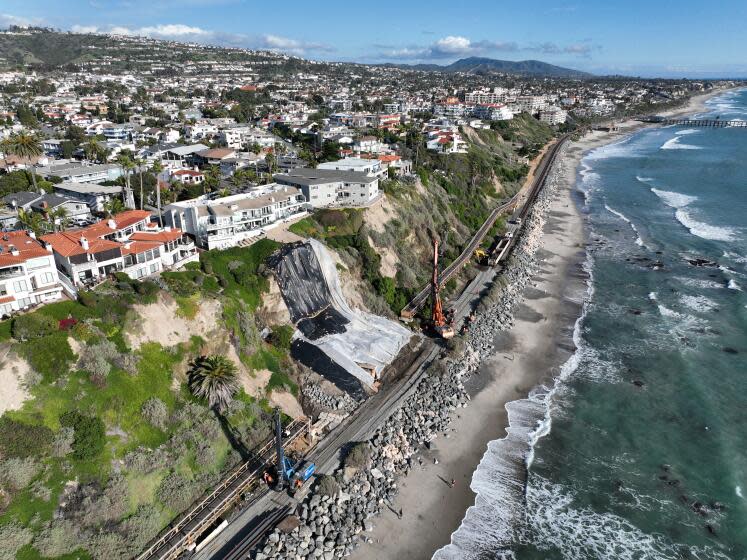After landslides, limited train service resumes along troubled Orange County rail line

Passenger trains are once again rolling along a scenic rail line through San Clemente — but on a limited basis.
The reopening of the line Wednesday marks the first time in more than a month that passengers have been able to hop aboard Amtrak's Pacific Surfliner and ride through the coastal swath between Orange County and San Diego. A series of powerful winter storms saturated the hillside adjacent to the tracks, causing it to slide and crumble, and forcing officials to halt train service for weeks.
Construction crews have been working for roughly a week on a barrier wall at Mariposa Point that is expected to help shore up the hillside and prevent soil from falling onto the tracks. The wall, which will be 10 to 15 feet high and 192 feet long, will be similar to the one constructed last year below the Casa Romantica Cultural Center and Gardens.
Read more:Construction begins on barrier wall to protect threatened Orange County train tracks
“OCTA and Metrolink emergency crews worked on full steam to build the catchment wall, resulting in construction progressing ahead of schedule," Orange County Supervisor Katrina Foley said in a statement. "We remain committed to working safely and efficiently to fully resume rail service in the near future.”
Crews have finished placing the 33 steel beams necessary for the foundation of the wall. Construction on the full wall will continue, but transit officials conducted a risk analysis and determined some passenger service could safely resume this week, said Puja Thomas-Patel, the marketing and communications manager at LOSSAN Rail Corridor Agency.
Officials hope to fully reopen rail service by early April.
"The portion of our corridor between Los Angeles and San Diego is 60% of our ridership," Thomas-Patel said. "We were hearing from customers that they wanted us to restart as soon as possible."
Read more:Amid crumbling cliffs, Orange County considers moving its famously scenic rail line inland
Southbound Pacific Surfliner train 562, which runs in the morning, and the 784, which runs in the evening, as well as the northbound 765 morning train and the 587 evening train will be fully reinstated without bus connections. To limit the number of trains, Metrolink will not immediately resume service through the area, transit officials said.
The Pacific Surfliner trains will pass through San Clemente between 7 and 8 a.m. and 6 and 7 p.m. Midday passenger trains remain halted to allow crews to work on the catchment wall. Bus connections will continue to be available for those trains.
On Wednesday morning, officials were seeing higher ridership numbers than in past weeks when the rail line was using buses between Irvine and Oceanside to help navigate around the closure, Thomas-Patel said.
"We're already seeing that, in fact, this is something our passengers and our customers wanted and needed," she said.
Erosion in the area has interrupted train service several times in the past three years, and officials are still considering plans to improve movement across the rail system. The Orange County Transportation Authority has launched two studies — one to evaluate strategies to stabilize the hillside to protect rail service for the next 30 years, and another, longer-term plan to potentially move the tracks farther inland.
This story originally appeared in Los Angeles Times.
